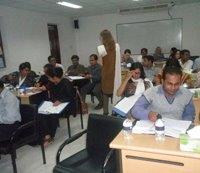Focus on Health Impact
One of HEMU’s strengths lies in its ability to quickly respond to the health economic needs of NCEZID and other CDC centers and offices. HEMU’s work aligns well with CDC’s recent increased focus on measuring the impact of public health interventions by using cost-benefit and cost-effectiveness analyses.
HEMU consistently strives to develop working relationships with other modeling groups from CDC and HHS agencies to ensure that different perspectives are taken into account. For example, one such partner is the Biomedical Advanced Research and Development Authority (BARDA) in the Office of the Assistant Secretary for Preparedness and Response (ASPR). Along with developing mutually beneficial relationships with internal and external partners, HEMU also provides opportunities for persons to learn health economic concepts through an internal CDC lecture series, oral presentations for public health professionals outside of the CDC, webinars, and peer-reviewed publications.
CDC Center for Global Health Technical Support Core (TSC) Consultation

In 2008, CDC’s Center for Global Health Global Disease Detection (GDD) program established a team of dedicated experts, the Technical Support Corps (TSC), to address the specific needs of the international GDD sites. The mission of the TSCs is to provide tactical support to the GDD Centers on an as-needed basis. As a member of the TSC, HEMU provides health economic and modeling support to GDD centers around the globe through training and project consultation requiring economic evaluation. Examples of international sites where TSC and HEMU have been contacted for consultation are Bangladesh, China, Guatemala, Kazakhstan, Kenya, and South Africa.
Support to CDC’s Emergency Operations Center
HEMU’s primary approach to emergent events is to help decision-makers address their challenge of making key informed decisions very quickly. Unlike large-scale academic models that often require teams of people taking a lot of time to program and re-program complex software tools, HEMU’s models can rapidly help inform decision-makers about various emergency scenarios by using simple spreadsheet-based models.
HEMU has supported the CDC Emergency Operations Center in a variety of public health responses, including:
- 2009 Influenza A H1N1
- 2012 Response to H3N2v Influenza monovalent vaccine
- Human Infections of Avian Influenza (H7N9)
- Middle East Respiratory Syndrome – Coronavirus (MERS-CoV)
- Polio Eradication
- Multistate Outbreak of Fungal Meningitis and other infections
- Pandemic influenza exercises
- MedCon: Estimate of pre-event population at risk of Medical Consequences